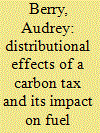| Srl | Item |
| 1 |
ID:
171378


|
|
|
|
|
| Summary/Abstract |
Energy subsidies cost Ecuador 7% of its public budget, or two thirds of the fiscal deficit. Removing these subsidies would yield local economic and environmental benefits and help implement climate targets set in the Paris Agreement. However, adverse effects on vulnerable households can make subsidy reforms politically difficult. To inform policy design, we assess the distributional impacts of energy subsidy reform using Ecuadorian household data and an augmented input-output table. We find that subsidy removal without compensation would be regressive for diesel and LPG, progressive for gasoline, and approximately neutral for electricity. We then analyze how freed up public revenues could fund in-kind and in-cash compensation schemes to mitigate income losses for poor households. Our results indicate that removing all energy subsidies and increasing the cash transfer program, Bono de Desarrollo Humano (BDH), by nearly US$ 50 per month would increase the real income of the poorest quintile by 10% while leaving more than US$ 1.3 billion for the public budget. Finally, we conduct interviews with local policy makers and experts to identify two reform options that are progressive and considered feasible: eliminating subsidies on gasoline while increasing the BDH and replacing universal LPG subsidies with targeted LPG vouchers.
|
|
|
|
|
|
|
|
|
|
|
|
|
|
|
|
| 2 |
ID:
162902


|
|
|
|
|
| Summary/Abstract |
This paper studies the distributional effects of France's recently introduced carbon tax. Using a microsimulation model built on a representative sample of the French population from 2012, it simulates the taxes levied on each household's consumption of energy for housing and transport. Without revenue recycling, the carbon tax is regressive and increases fuel poverty. From a policy perspective, this finding indicates that the question of fuel poverty cannot be ignored in the quest for a fair ecological transition. It proposes that some of the revenues from the carbon tax should be redistributed to households. Different designs of cash transfer to support households are then compared. The results show that the inequities of the carbon tax could be offset at reasonable cost relative to total carbon tax revenues. However, adjusting the design of cash transfers to criteria other than income level does not diminish the cost of compensating households. The benefits of finely adjusting cash transfers may therefore be somewhat limited. Most notably, the results show that targeting revenue recycling at low-income households would help to reduce fuel poverty substantially. This study therefore indicates that carbon taxation actually provides an opportunity to finance ambitious policies to fight fuel poverty.
|
|
|
|
|
|
|
|
|
|
|
|
|
|
|
|
| 3 |
ID:
186482


|
|
|
|
|
| Summary/Abstract |
We examine the economic impacts of using the revenues from environmental taxation to reduce a pre-existing distortionary tax in a multisector economy where the environmental regulation and pre-existing distortionary tax apply heterogeneously across polluting sectors. With a numerical framework including a detailed sectoral disaggregation, we quantify these in the specific case of the European Union where carbon pricing coexists with electricity levies employed to support renewable energy. We find that using auction revenues from the EU Emissions Trading System (ETS) to reduce the national levies results in a 1.8% ETS carbon price increase but a 5.9% drop in the non-ETS carbon constraint. While the energy intensive sectors often benefit from electricity levy exemptions, the combination of these exemptions and of the recycling of carbon auction revenues to support renewable energy makes the ETS sectors worse off than if carbon revenues are transferred to households. In aggregate, the recycling option analysed here results in a GDP gain due to its impacts on the non-ETS sectors, the reduction of the electricity levy and associated distortionary effects.
|
|
|
|
|
|
|
|
|
|
|
|
|
|
|
|